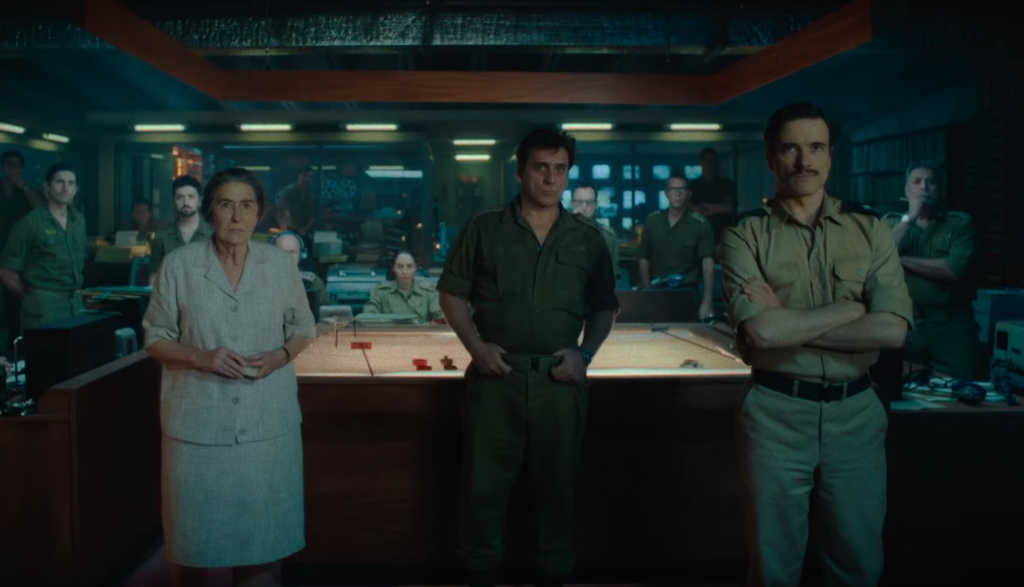
It’s 1973. In Israel, war looms on the horizon.
War, of course, has loomed (and raged) ever since the nation was reborn in 1948. But it’s left Prime Minister Golda Meir with a difficult choice.
Israeli intelligence shows at least a million Egyptian and Syrian troops converging on the country’s borders from the southwest and northeast, respectively. But those in charge of an Israeli response don’t agree on how serious the threat is. After all, their eavesdropping system hasn’t picked up any chatter regarding plans for war, and it’s supposed to provide them with at least a 48-hour warning.
As for Golda, she would consider a preemptive strike were it not for both the division among her informants and her desire to keep a promise to the U.S. that Israel would not resort to that measure. Still, she must make a decision regarding how many troops to send in response to Egypt and Syria’s provocation.
It’s a pivotal decision for Golda Meir—one that will haunt her for the rest of her life.
It is apparent that Golda takes every dead Israeli soldier very seriously. Each time she’s told of the number of the deceased, she writes the number down in a personal book. She clearly blames their deaths on her choices, and she says as much near the end of the film. With that in mind, she doesn’t make any choice lightly. She knows everything she decides may result in more death.
At the same time, Golda grapples with what must be done to achieve victory, contemplating whether she’s strong enough to be the ultimate cause of many deaths, even deaths of Israel’s enemies. She views casualties on both sides primarily in terms of “widows and orphans” left behind rather than characterizing those battles as either victories and losses.
The war is dubbed the Yom Kippur War, in reference to the day that the war started. Yom Kippur, meaning Day of Atonement, is the holiest day in Judaism, on which Jews repent and ask God for forgiveness of their sins.
Someone describes a battlefield as like “heading into hell.”
Golda takes a bath, though nothing is seen.
We do see plenty of explosions on a battlefield, and we listen to panicked voices on the front lines via radio. Later, we also listen to some troops as they’re ambushed. We don’t see anything, but we hear their terrified cries for help as they are eventually killed. We also hear such cries of terror when Golda suffers through night terrors and anxiety attacks.
Golda tells a story of intoxicated men who would murder Jewish people for fun.
As Golda listens to a military ambush against Israel take place, she presses her fingernails into her hands, drawing blood. Golda has lymphoma, we learn, and she spits up blood as the cancer gets worse, and we see her receiving medical treatment. Later, she passes away in a hospital bed.
A couple shots show a morgue full of bodies; we only glimpse the feet of the deceased sticking out from under a blanket. We also see dozens of dead birds in a hallway.
The s-word is used once. “H—” is used three times, and “d–n” is used once. God’s name is used in vain once.
Golda has a cigarette in hand in most scenes, even taking a quick puff or two during hospital treatments for her lymphoma. She also takes prescription medication. Golda mentions Richard Nixon’s frequent drinking. Characters have celebratory drinks.
Someone boasts about the power of an eavesdropping system, saying “when [Egyptian President Muhammad Anwar el-Sadat] breaks wind, I hear it first.” A man vomits.
Golda doesn’t depict soldiers dodging bullets and performing acts of heroism. Instead, it grapples with the darkness of this violent chapter of Middle Eastern history.
The Yom Kippur War may have ended in an Israeli victory, but it stunned Golda and her country all the same, revealing that they had become complacent following multiple victories in earlier conflicts—most notably the Six-Day War.
According to Mapam leader Ya’akov Hazan, Golda Meir contemplated suicide in the early days of the Yom Kippur War, “because she could not bear the thought of her moral responsibility for the pre-war unpreparedness.” And while we don’t see her grapple with that notion, the story does focus on how the conflict deeply affected this Israeli leader.
Even as she sits in relative safety in Tel Aviv, Golda cannot distance her mind from the front lines. She tallies each Israeli death in a personal notebook, and they all weigh heavily on her heart. And as we sit with her through the month-long war, we understand a bit of the pain she felt.
The worst onscreen violence we see is when Golda pierces her own hand with her fingernails. That said, offscreen violence can still feel very intense as we listen to the panicked screams of soldiers just before their enemies kill them.
Golda stays relatively clean for a war movie, focusing on how war affects the people who make its decisions as well as acting as a somber memorial to Golda Meir herself.


Kennedy Unthank studied journalism at the University of Missouri. He knew he wanted to write for a living when he won a contest for “best fantasy story” while in the 4th grade. What he didn’t know at the time, however, was that he was the only person to submit a story. Regardless, the seed was planted. Kennedy collects and plays board games in his free time, and he loves to talk about biblical apologetics. He thinks the ending of Lost “wasn’t that bad.”